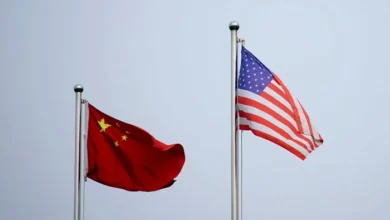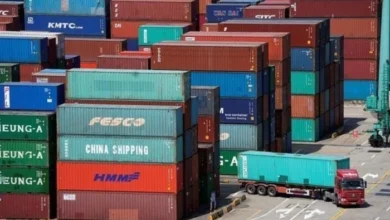Over the past few years, women in Pakistan have stepped into leadership roles, launching bold tech-driven businesses in fields like e-learning and digital marketplaces. In a sector long seen as a man’s domain, these women in ICT aren’t just shattering stereotypes — they’re tackling tough social issues, from education gaps to healthcare access, through their work.
Their strides come as the world marks International Girls in ICT Day every April. The 2025 theme, “Girls in ICT for inclusive digital transformation”, zeroes in on making sure women — especially those in marginalised communities — get equal access and fair opportunities in tech.
To mark the occasion, Geo.tv talked to women on the ground playing a role in helping others deal with society’s most pressing issues with their efforts. From creating apps to connect rural families with doctors to providing access to safety and swift justice, they’re pushing past old barriers to drive change.
Seeking holistic justice for the neglected
Lawyer and activist Khushbakht Shah Jillani started Mehfooz.ai out of sheer frustration with Pakistan’s legal system, which is riddled with systemic discrimination against women. Even as a practising lawyer, she saw firsthand how hostile the courts were to female litigators. Despite women making up just 17% of lawyers nationwide, Jillani recalls judges dismissing their arguments or belittling them openly.
But what shook her came in 2019. While volunteering to rally support for the Aurat March in Karachi’s working-class neighbourhoods, she went door-to-door — and door after door, she met women trapped in abusive marriages, silenced by threats of losing custody of their children if they dared speak up.
“I learned they had nothing — no info, no help as they lived in constant fear,” Jillani says, her voice edged with frustration. For these women, even marital rape wasn’t considered a crime. As a frontline lawyer, she faced worse: courts slapped “frivolous” labels on her petitions. Once, a judge scoffed at the law itself, calling it “absurd.” The province’s top court? They labelled her work an “overreaction.”
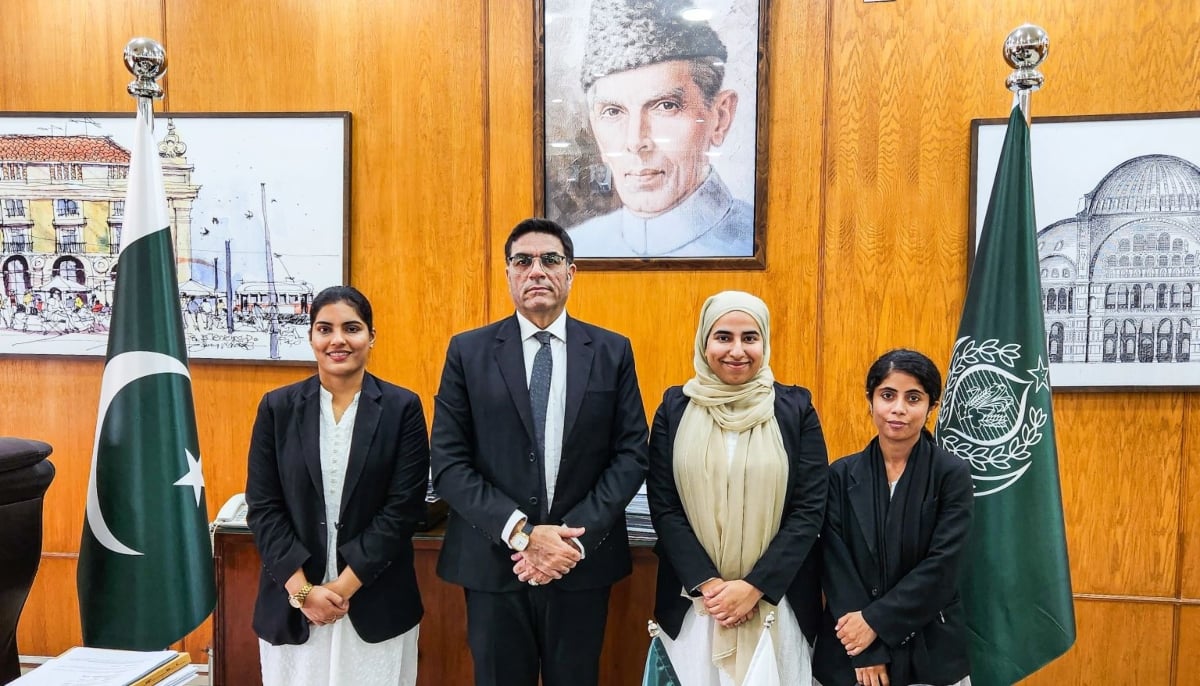
Domestic abuse cases surged by 200% during the 2020 pandemic, pushing her to a breaking point. The first action she took was to leave her corporate law career to fight violence against women through litigation. “As a lawyer, I recognised that legal support was imperative, but it became clear to me early on that the crisis also presented a public health emergency requiring medical care, psychological support, and safety to realise holistic justice.”
She then sought support from doctors and lawyers through Adal Aur Sehat – her legal and health awareness non-profit.
Determined to drive systemic change through an alternate mechanism, her team tested the waters with technology through Adal Aur Sehat’s online platform. The lawyer believes that Mehfooz.ai can work as an alternative to training judges and lawyers, improving how justice systems respond to victims of domestic violence.
“Still in its developmental stage, Mehfooz.ai is a generative AI Agentic decision support platform that plugs the fatal gap between women’s experience of domestic violence and courts that are progressive in law but patriarchal in practice,” she explains.
The app takes in laws, medical reports, affidavits and flags missing evidence, and lethality indicators and generates a brief in simple language for the judge. It is essentially a law researcher providing all the required information with a bias detector.
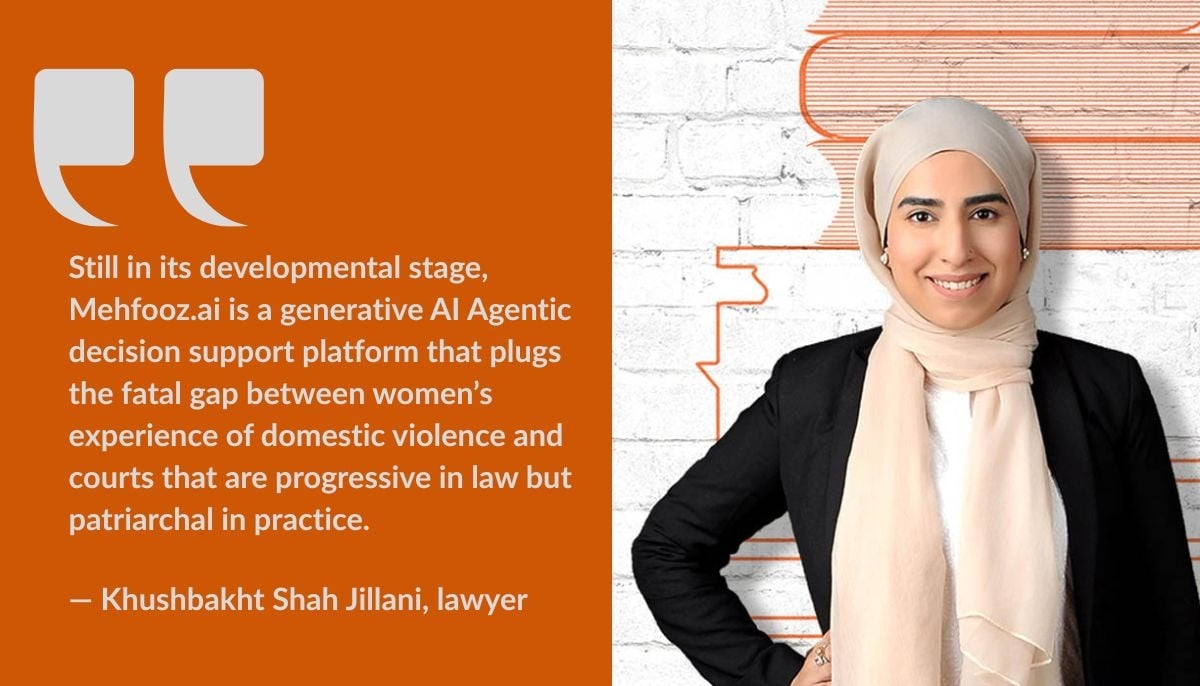
Jillani puts forward two courtroom scenarios. In the one without the app, the survivor’s complaint sits untouched as the judge receives an incomplete record. Meanwhile, with the app, large language models (LLMs) — trained on thousands of South Asian domestic violence cases and global jurisprudence — instantly analyse the case file and generate a pre-hearing brief to support judicial decision-making. The judge receives real-time prompts on sensitive questioning and protective measures, enabling a protection order within days, not months.
Jillani highlights that the model is similar to the UK’s Judicial College and Estonia’s e-Court system, which they have begun exploring. She stressed that using AI is not meant to replace judges but to help them see what they often miss. She believes that AI has a role in transforming the judicial experience by equipping courts with instant access to global case law, survivor-centric language, and tools that help flag bias and accelerate protection orders.
However, the lawyer suggests that platforms like Mehfooz.ai should not be viewed as charity work, as they are “essential innovations for building safer, more just societies, in addition to reducing the loss of life among 1.1 billion women and the economic cost of US $8 trillion in legal and medical expenses, lost productivity, and employee retention.”
Jillani envisions Mehfooz.ai as a global social innovation that can be localised and adopted in jurisdictions facing similar systemic gaps. She plans to integrate interdisciplinary expertise to not only be more accurate but also more human-centred.
Breaking the stigma
Mental health awareness has seen a major shift in the past couple of years and is now considered an important issue which cannot be ignored.
Sharmeen Khan, a clinical psychologist, has extensive experience working with both the public and private sectors. Her niche has been the rapid response in disaster management—floods, heat waves, earthquakes—and consultancy. Having catered to the 2015 earthquake, the Abbas Town blast, the APS massacre, and multiple natural disasters, the COVID-19 pandemic was very different and required unique interventions. Contemplating her next step, Khan decided to target a specific issue she encountered in mental health services for South Asians; hence, Be Me. Global was founded.
“I was getting so many queries, not just from Pakistan but from people around the world, where South Asians were looking for mental health solutions in their own language and a particular sensitivity to their own culture,” she said.
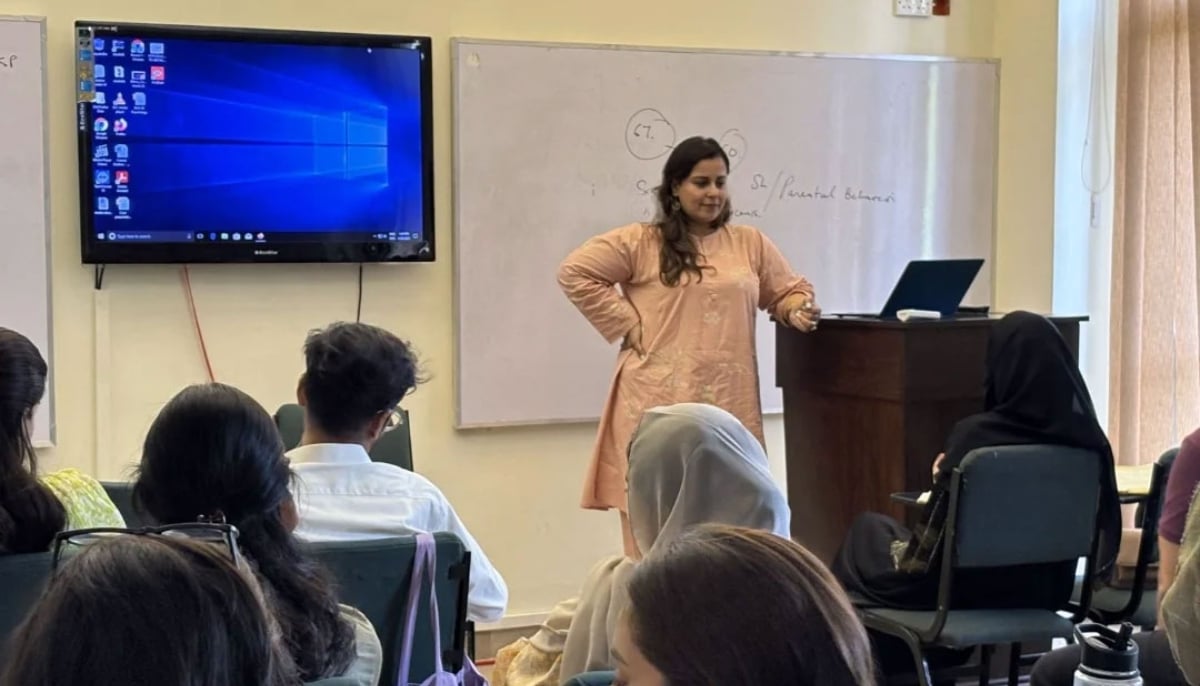
“Moreover, many believe that seeking therapy is going to be expensive so they provide options to clients based on their affordability as well. At the same time, it also caters to ‘very qualified’ professionals who are underutilised and not getting enough work.”
Considering that brick-and-mortar was not possible at the time, Khan and her co-founder sat down and planned how they were going to provide this service.
They stressed that their health-tech model is based on four pillars: quality, confidentiality, clinical needs and affordability. While the online platform allows easier access to therapy, in a country like Pakistan where connectivity issues and power outages are common, Be Me.Global was not alone when the crisis hit last year.
“Last summer, when the internet stopped working and many tech companies went out of business, it was the first time our integrity was called into question,” Khan shares.
“It takes a while for health-techs to become profitable, and when three companies collapsed in a row, investor morale followed suit.”
However, the team persevered and implemented certain measures to address technical issues. “Mental health experts on the platform are known as ‘providers’. We conduct a one-hour interview in which they are asked about their ethics, clinical practices, internet service providers, net speed, and backup plans. They can switch to 4G, which mostly works,” Khan elucidated.
When troubleshooting does happen during a session, they offer clients discounts and complimentary follow-up.
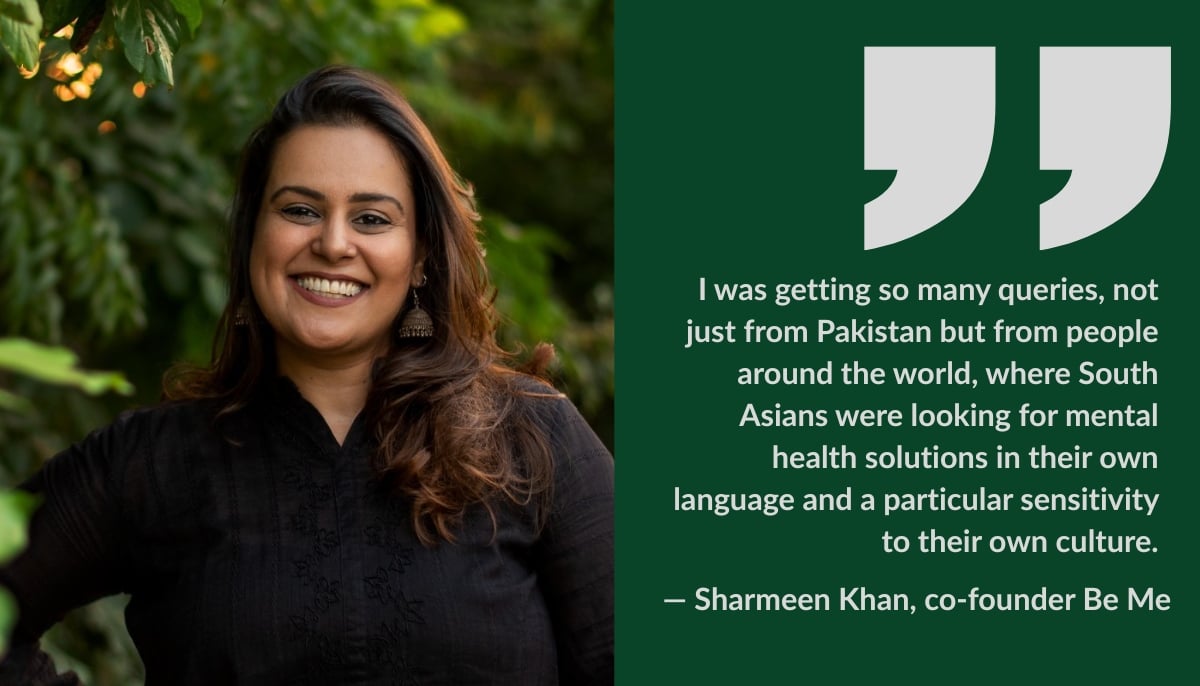
“There are also therapists in Dubai and England to ensure that international clients are catered in case of any issues.”
As for privacy, the platform has a stringent system in place. “If we ever receive a complaint that a provider has not maintained full confidentiality — which can happen with any brand or platform — we take the feedback very seriously and discontinue our partnership with the therapist if they are found in breach of the code of conduct.”
However, it is a two-way street and the complaint is verified before action is taken, she says adding that staying true to their values, they are now scaling up their business, she adds.
“We are in the planning phase of enhancing our existing portal to make therapy easier for our providers. We already have an electronic medical system where clients go through a pre-screening, saving them 15 to 20 minutes during their first session.”
“We also have a live medical update system where each session is uploaded and stored as confidential information — HIPAA-compliant — ensuring that no one else has access to it.”
They are also planning to put in a system which determines that the providers are not going through burnout via a smart wrist-wearing system.
“A feature for ambient note-taking is almost ready for integration. Meanwhile, a differential diagnosis assistant is in the works which helps with tentative diagnosis before the session.”
During the initial screening, after the forms have been filled, the device will help AI determine symptoms and automatically direct them to relevant tests for certain conditions and give a more comprehensive analysis before the first session,
For the future, Be Me.Global is looking to expand into other regions as well.
Bridging gaps for better healthcare
According to a recent health report, 50% of Pakistan’s population does not have access to basic primary healthcare services.
In a country where the health sector was allocated merely 1.71 per cent of the total GDP in the 2024-25 budget, Marham.pk is making efforts to provide easier access to healthcare by connecting patients directly to qualified doctors.
Asma Salman Omer, a software engineer and UX designer, is one of the co-founders of Marham.pk.
“What began as a social initiative has evolved into Pakistan’s leading healthcare super app,” an excited Omer said.
In her words, the need for a reliable, tech-enabled platform to bridge information gaps and support better patient-doctor interactions transformed a simple Facebook community into Marham.pk.
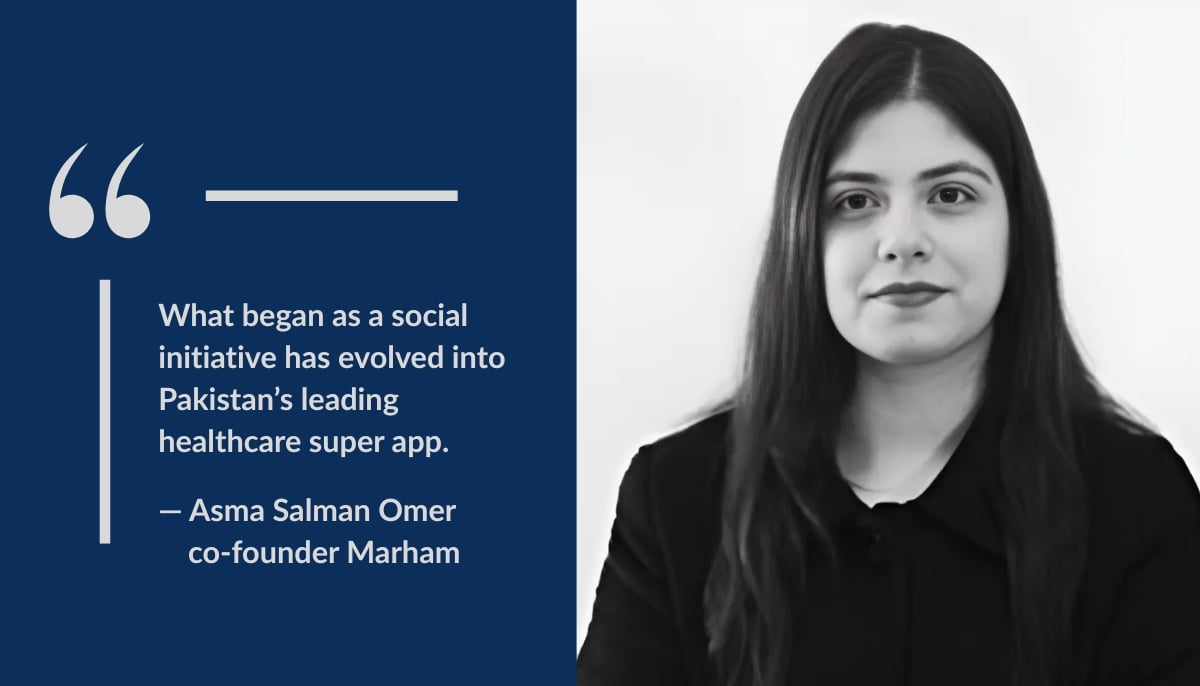
The app is essentially an integrated ecosystem. The patient app and website allow you to book appointments, take online consultations, and order lab tests and medicines. Meanwhile, the Doctor app enables doctors to manage appointments, update their profiles, and consult patients through telemedicine with access to reports and medical histories.
According to the co-founder, their team is actively working on integrating AI-driven solutions as well. “It will help patients match with the right doctors based on symptoms and case history. Provide intelligent tools to doctors and patients to monitor progress, better diagnosis and improve treatment success.”
When asked how the app functions during internet outages and connectivity issues, Omer said that a backup was in place.
“We’ve built a telephone helpline to ensure access for people without stable internet — especially in areas affected by power outages or limited connectivity — telecom signal disruptions still pose a major barrier,” she noted.
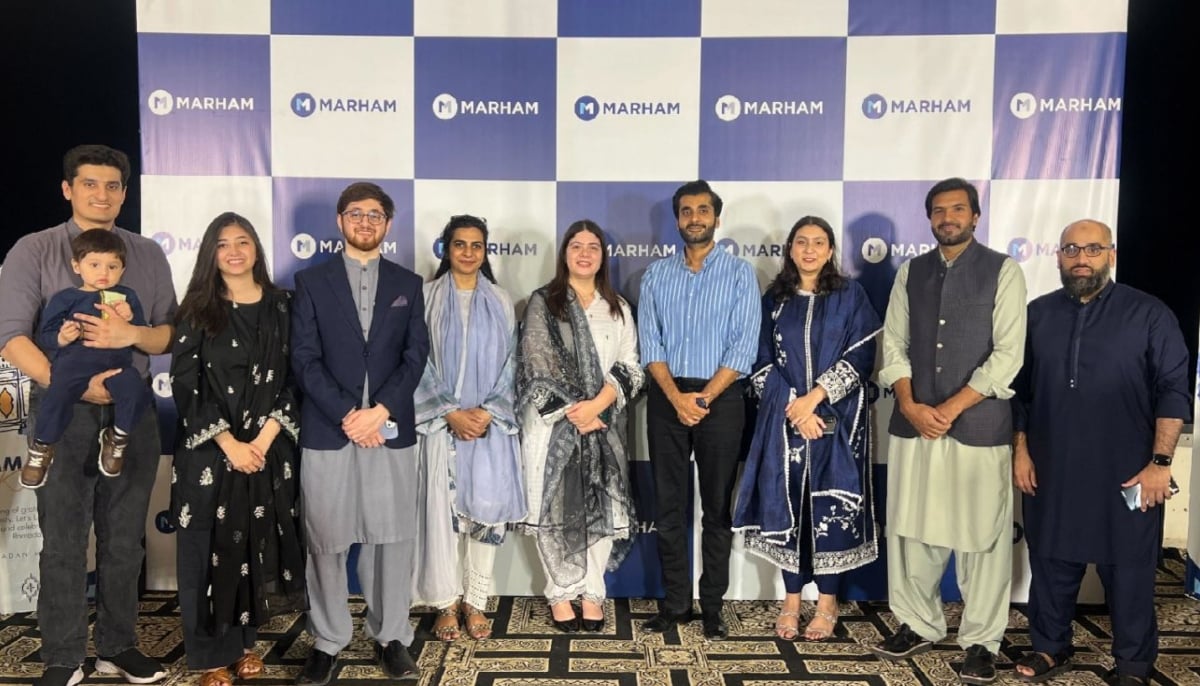
“In such situations, our ability to connect patients with healthcare services becomes constrained, and patients suffer badly despite systems and doctors’ availability.”
Even though the initial popularity of the initiative was great, Omer shared that they still faced the challenge of building trust, especially among doctors.
“In a traditionally in-person system, change was slow, particularly in adopting telemedicine and new digital tools,” she said. “We overcame this by focusing on consistent service quality, creating value for doctors, and building a team that listened closely to both patients and physicians. Step by step, we earned that trust.”
Omar — recently nominated as a Young Global Leader for 2025 by the World Economic Forum — is now focused on enhancing its service, expanding partnerships, and integrating new technologies to deepen the impact of preventive care.
She also hopes her recognition on a global platform will “create opportunities to collaborate with changemakers, access global research, and bring back insights to improve the healthcare experience in Pakistan.”
With the growing influence of AI and its immense potential, it is crucial to channel this power toward solving our most urgent social challenges — just as these women have done.


